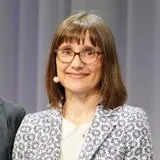We know that many people would prefer to die at home, surrounded by their loved ones and supported by community services. The COVID-19 pandemic worsened inequalities relating to end-of-life care and highlighted that we are unequal in death. It is essential that services are able to support people to die at home, if that is their preference.
Professor Katherine Sleeman from the Cicely Saunders Institute of Palliative Care
16 June 2023
People in richer areas saw biggest increase in deaths at home during the pandemic
The gap between where the rich and poor die widened during the pandemic, new research has found.

The study, published in Palliative Medicine by researchers at King’s, Hull York Medical School at the University of Hull and the University of Cambridge, and funded by Marie Curie, compares home deaths in the UK in 2020 to 2019.
Most people who express a preference say they would prefer to die at home, where they might be surrounded by their loved ones and be supported by home-based end-of-life care. While the pandemic saw an increase of people who died at home, this increase was greater for people living in wealthier areas.
The authors say that the disparity between socioeconomic groups highlights the need for more investment in community-based support in more deprived areas.
All four UK nations showed an increase in the proportion of home deaths between 2019 and 2020, ranging from 21% to 28%. In England alone, almost 23,000 more people died at home between March 28th and December 31st in 2020 compared to 2019. The most deprived areas saw a 6.5% increase in home deaths, while the least deprived areas saw a 20% increase.
The authors say more research is needed to understand the reasons behind the disparity. Visiting restrictions implemented in hospitals, hospital avoidance, and changes in the patterns of acute hospital use during the pandemic might explain the increase in the proportion of home deaths overall. For those in more deprived areas, poor housing conditions or limited access to community-based support may have contributed to the observed trends.
Dr Javiera Leniz from the Cicely Saunders Institute of Palliative Care said: “Everyone approaching the end of their life, regardless of socioeconomic background, should have the care and support they need, in the place of their choosing. We must learn from the weaknesses in care that have been exposed by the pandemic to improve end of life care for all who need it. This is especially important given that palliative care needs will increase dramatically over the next decade.”
Professor Fliss Murtagh from Hull York Medical School, University of Hull, said: “We know that deaths at home increased notably during the pandemic but our research shows that this change occurred differently within different parts of our community. We urgently need to understand why this is so; and work to reduce inequities in access and care wherever possible.”
Dr Sam Royston, Executive Director for Policy and Research at Marie Curie said: “The pressure on end of life care in the community – care provided in people’s home or care home – is huge and we have serious concerns that some people with terminal illness are not getting the help they need. This can lead to people dying in hospital without them needing, or wanting, to be there. And this isn’t just a pandemic issue. This is a problem now. More people are dying at home than before the pandemic and this trend isn’t dropping away. Government’s must address current challenges but also plan for the known future increase in palliative care needs. If nothing changes, we’re worried that people living in poorer areas will suffer the most and, behind closed doors in people’s homes, dying people will not be having the peaceful death that we all hope to have for ourselves.”
The research used data made available through the Data and Connectivity National Core Study, led by Health Data Research UK in partnership with the Office for National Statistics.


